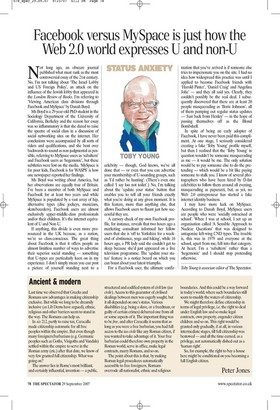Ancient & modern
Last time we observed that Greeks and Romans saw advantages in making citizenship exclusive. But while we long to be dreamily inclusive (as Lib Dems have argued), ethnic, religious and other barriers seem to stand in the way. The Romans can help us.
In Al) 212, partly to raise tax, Caracalla made citizenship automatic for all free peoples within the empire. But even though many foreigners/barbarians (e.g. Germanic peoples such as Goths, Visigoths and Vandals) settled within the empire to serve in the Roman army (etc.) after that date, we know of very few granted full citizenship. What was going on?
The answer lies in Rome's most brilliant, and certainly influential, invention — a public, structured and codified system of civil law (ius civile). Access to this guarantor of civilised dealings between men was eagerly sought, but it all depended on one's status. Various disabilities (e.g. being a slave, or a freedman, or guilty of certain crimes) debarred one from all or some aspects of it The important thing was to be free, and after Caracalla it seems that as long as you were a free barbarian, you had full access to the his civile like any Roman citizen, if you wanted to take advantage of it Your free barbarian could therefore own property in the Roman world, serve in office, make legal contracts, many Romans, and so on.
The point about this is that, by making Roman legal procedures automatically accessible to free foreigners, Romans overrode all nationalist, ethnic and religious boundaries. And this could be a way forward in today's world, where such boundaries still seem to muddy the waters of citizenship.
We might therefore define citizenship in terms of legal privilege, i.e. the right to deal under English law and so make legal contracts, own property, engender citizen children and so on. This right would be granted only gradually, if at all, in various intermediate stages, till full citizenship was bestowed — and all the time earned, as a privilege, not automatically dished out as a 'human right'.
So, for example, the right to buy a house here might be conditional on you becoming a full English citizen.
Peter Jones























































 Previous page
Previous page